Intercultural Communication Reflection in Business - BUS101
VerifiedAdded on 2023/06/15
|7
|1397
|331
Essay
AI Summary
This essay provides a structured reflection on intercultural communication, as part of the BUS101 Business Communication course. It begins by defining intercultural communication and highlighting its significance in a globalized business environment. The reflection then delves into a personal perspective, emphasizing the author's interest in intercultural interactions and their relevance to their professional growth. Finally, it explores how intercultural communication skills can be applied in the author's current and future career, particularly in multinational settings, emphasizing the importance of cultural sensitivity, effective communication strategies, and continuous learning for professional success. The essay references academic sources to support its arguments and insights.
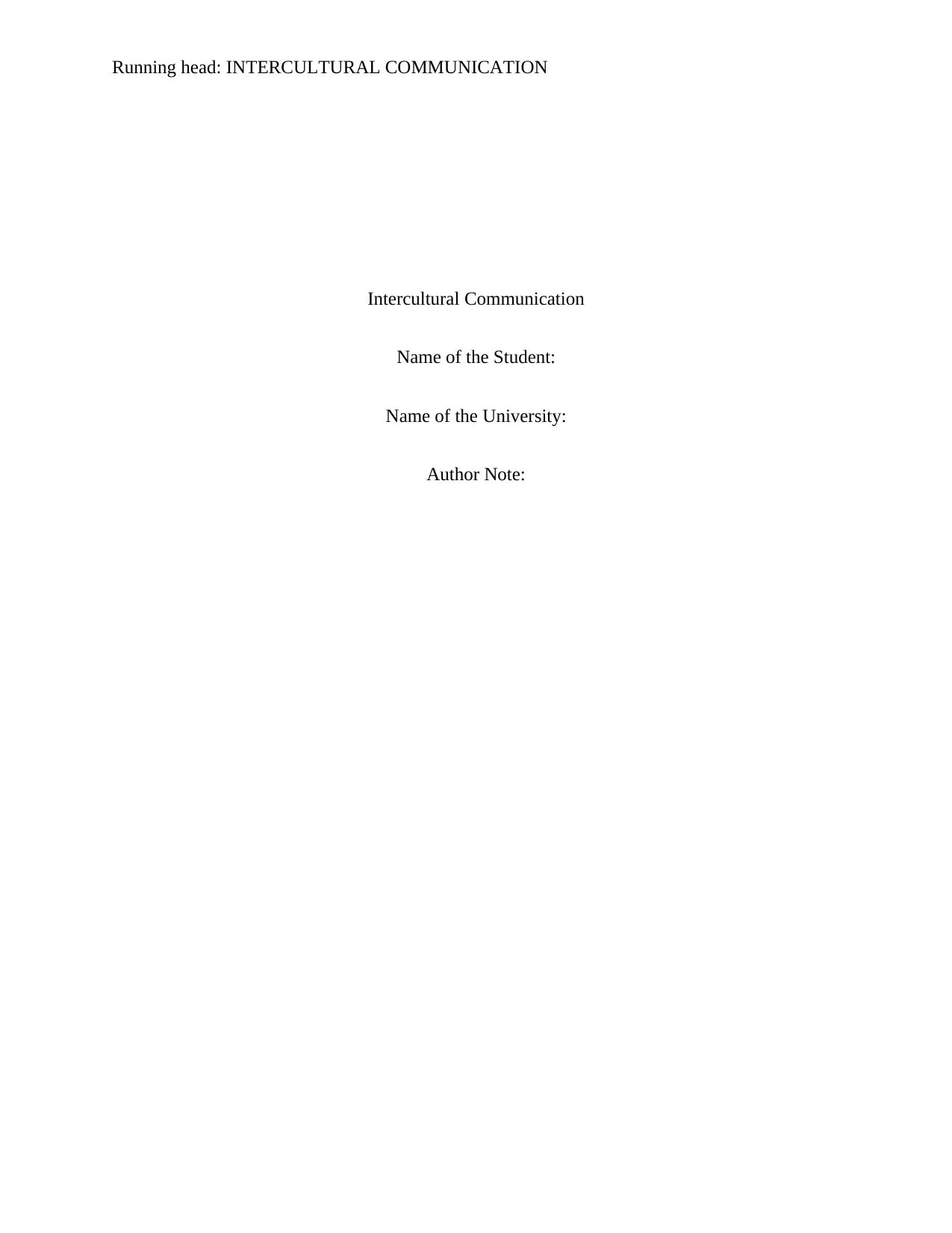
Running head: INTERCULTURAL COMMUNICATION
Intercultural Communication
Name of the Student:
Name of the University:
Author Note:
Intercultural Communication
Name of the Student:
Name of the University:
Author Note:
Paraphrase This Document
Need a fresh take? Get an instant paraphrase of this document with our AI Paraphraser
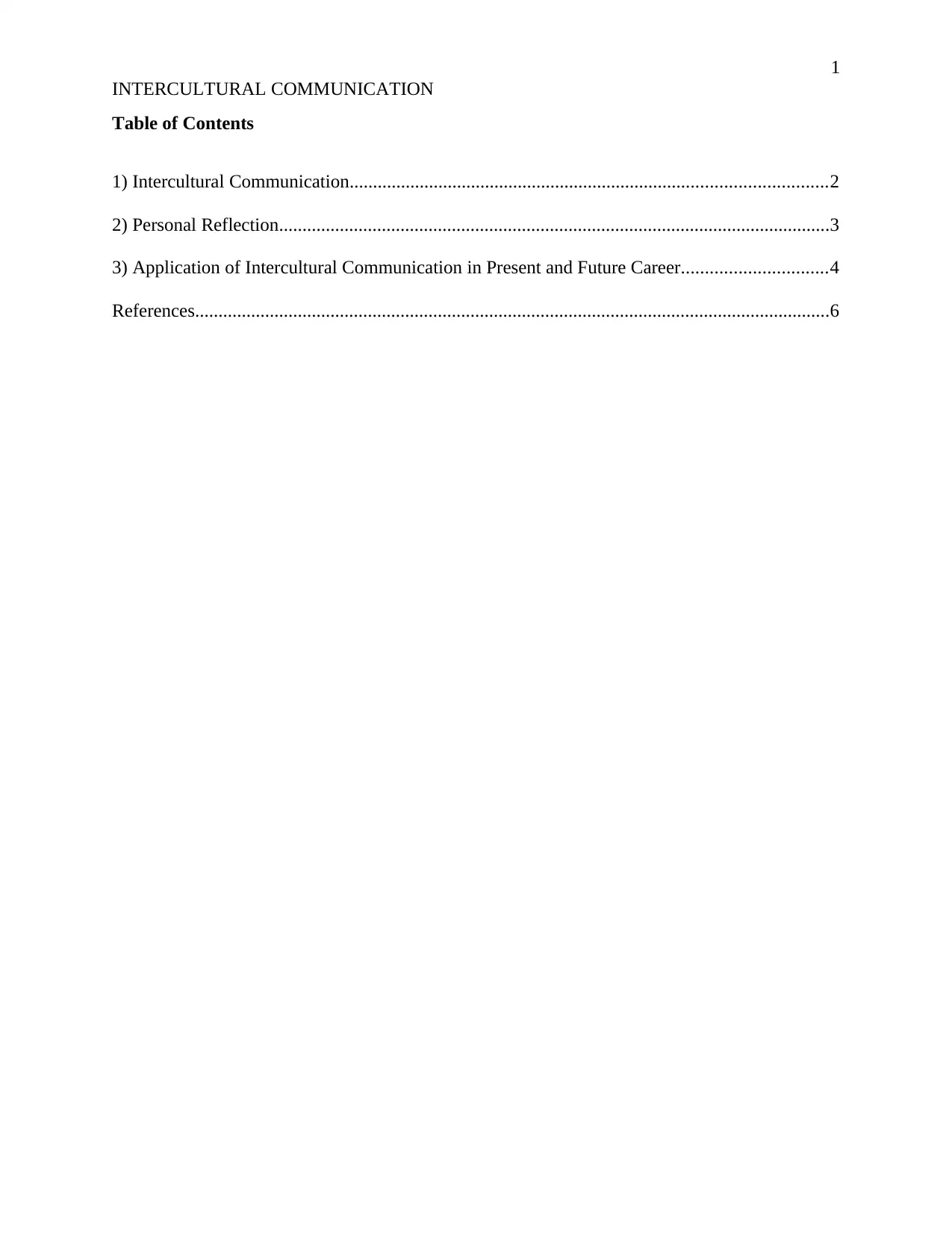
1
INTERCULTURAL COMMUNICATION
Table of Contents
1) Intercultural Communication......................................................................................................2
2) Personal Reflection......................................................................................................................3
3) Application of Intercultural Communication in Present and Future Career...............................4
References........................................................................................................................................6
INTERCULTURAL COMMUNICATION
Table of Contents
1) Intercultural Communication......................................................................................................2
2) Personal Reflection......................................................................................................................3
3) Application of Intercultural Communication in Present and Future Career...............................4
References........................................................................................................................................6
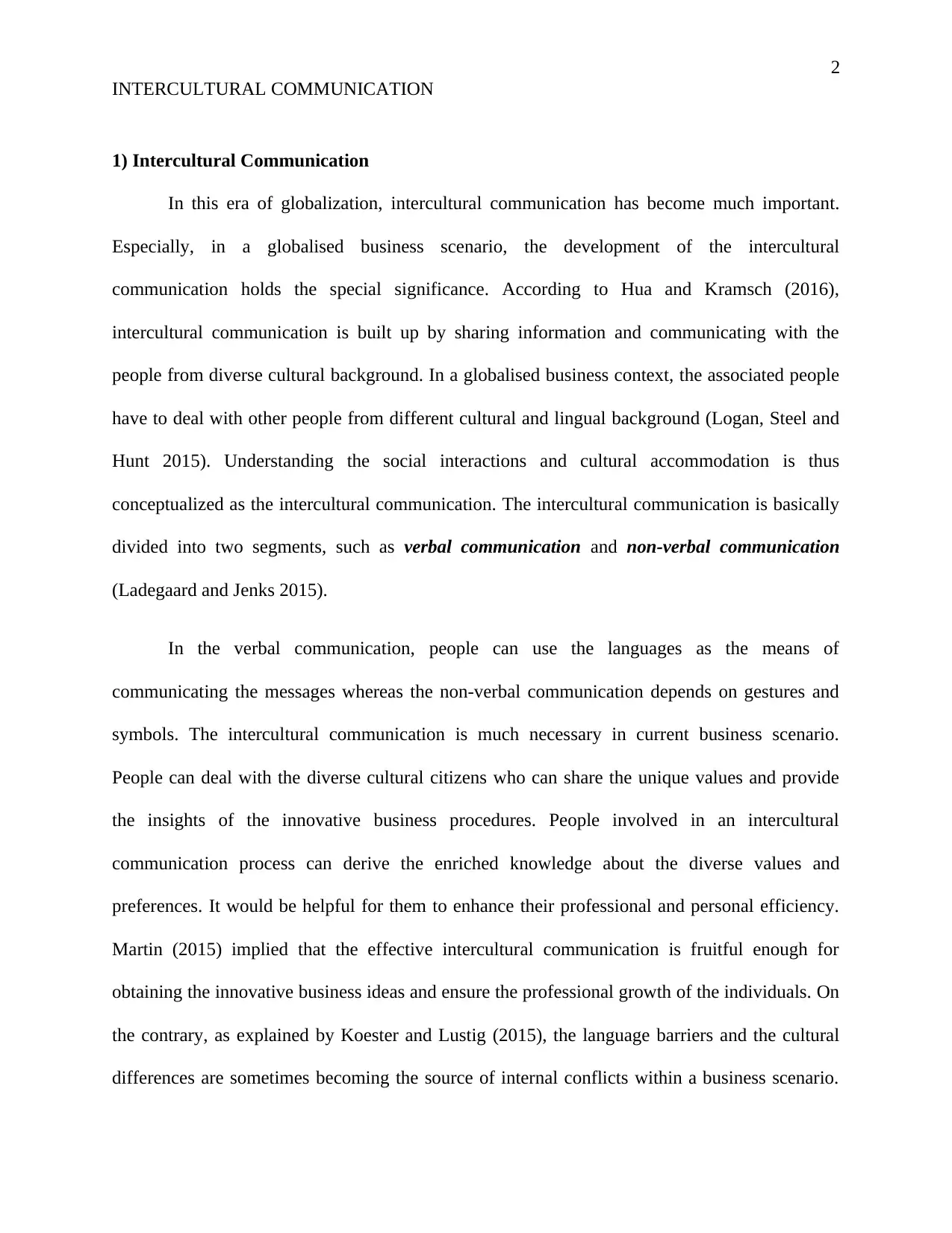
2
INTERCULTURAL COMMUNICATION
1) Intercultural Communication
In this era of globalization, intercultural communication has become much important.
Especially, in a globalised business scenario, the development of the intercultural
communication holds the special significance. According to Hua and Kramsch (2016),
intercultural communication is built up by sharing information and communicating with the
people from diverse cultural background. In a globalised business context, the associated people
have to deal with other people from different cultural and lingual background (Logan, Steel and
Hunt 2015). Understanding the social interactions and cultural accommodation is thus
conceptualized as the intercultural communication. The intercultural communication is basically
divided into two segments, such as verbal communication and non-verbal communication
(Ladegaard and Jenks 2015).
In the verbal communication, people can use the languages as the means of
communicating the messages whereas the non-verbal communication depends on gestures and
symbols. The intercultural communication is much necessary in current business scenario.
People can deal with the diverse cultural citizens who can share the unique values and provide
the insights of the innovative business procedures. People involved in an intercultural
communication process can derive the enriched knowledge about the diverse values and
preferences. It would be helpful for them to enhance their professional and personal efficiency.
Martin (2015) implied that the effective intercultural communication is fruitful enough for
obtaining the innovative business ideas and ensure the professional growth of the individuals. On
the contrary, as explained by Koester and Lustig (2015), the language barriers and the cultural
differences are sometimes becoming the source of internal conflicts within a business scenario.
INTERCULTURAL COMMUNICATION
1) Intercultural Communication
In this era of globalization, intercultural communication has become much important.
Especially, in a globalised business scenario, the development of the intercultural
communication holds the special significance. According to Hua and Kramsch (2016),
intercultural communication is built up by sharing information and communicating with the
people from diverse cultural background. In a globalised business context, the associated people
have to deal with other people from different cultural and lingual background (Logan, Steel and
Hunt 2015). Understanding the social interactions and cultural accommodation is thus
conceptualized as the intercultural communication. The intercultural communication is basically
divided into two segments, such as verbal communication and non-verbal communication
(Ladegaard and Jenks 2015).
In the verbal communication, people can use the languages as the means of
communicating the messages whereas the non-verbal communication depends on gestures and
symbols. The intercultural communication is much necessary in current business scenario.
People can deal with the diverse cultural citizens who can share the unique values and provide
the insights of the innovative business procedures. People involved in an intercultural
communication process can derive the enriched knowledge about the diverse values and
preferences. It would be helpful for them to enhance their professional and personal efficiency.
Martin (2015) implied that the effective intercultural communication is fruitful enough for
obtaining the innovative business ideas and ensure the professional growth of the individuals. On
the contrary, as explained by Koester and Lustig (2015), the language barriers and the cultural
differences are sometimes becoming the source of internal conflicts within a business scenario.
⊘ This is a preview!⊘
Do you want full access?
Subscribe today to unlock all pages.

Trusted by 1+ million students worldwide
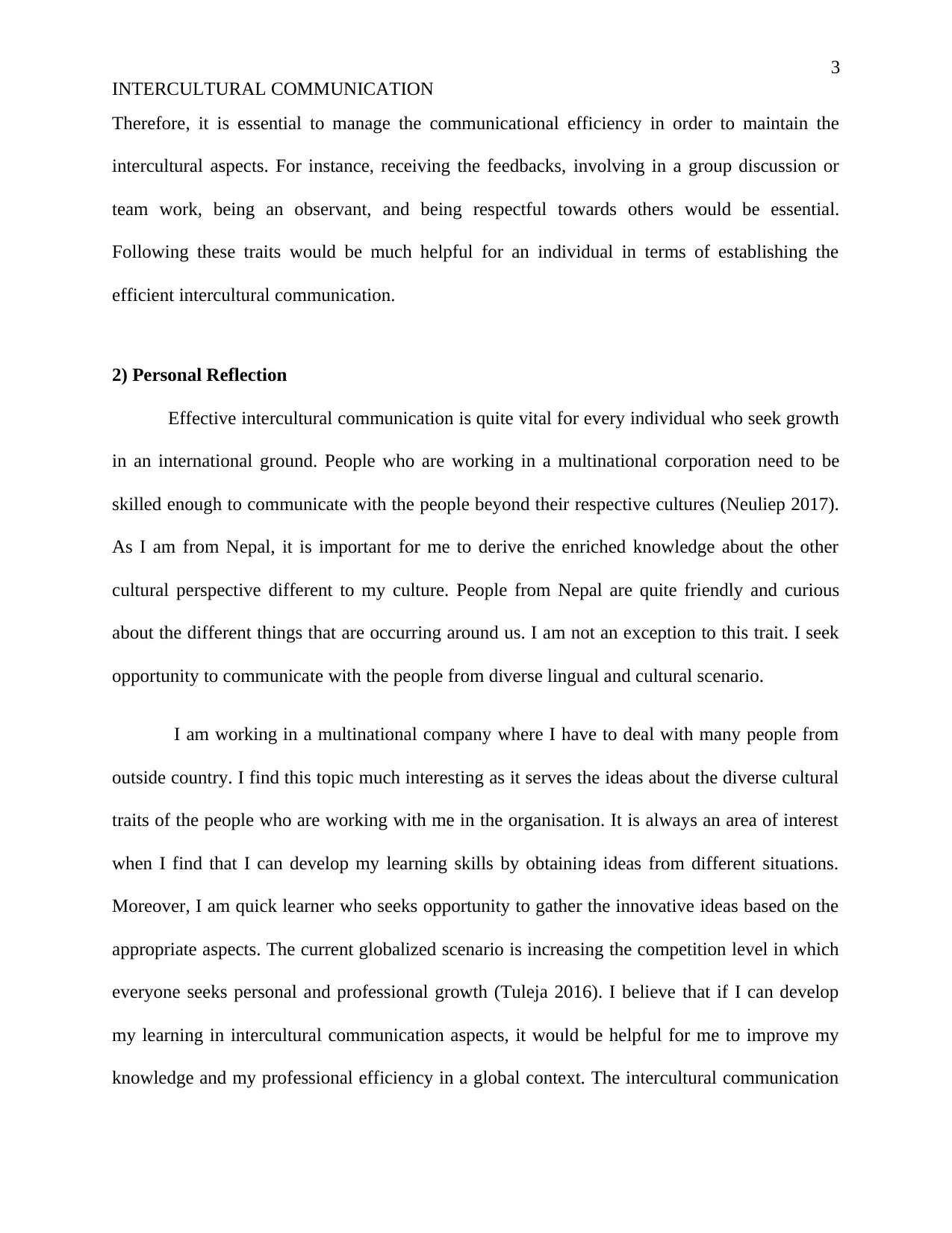
3
INTERCULTURAL COMMUNICATION
Therefore, it is essential to manage the communicational efficiency in order to maintain the
intercultural aspects. For instance, receiving the feedbacks, involving in a group discussion or
team work, being an observant, and being respectful towards others would be essential.
Following these traits would be much helpful for an individual in terms of establishing the
efficient intercultural communication.
2) Personal Reflection
Effective intercultural communication is quite vital for every individual who seek growth
in an international ground. People who are working in a multinational corporation need to be
skilled enough to communicate with the people beyond their respective cultures (Neuliep 2017).
As I am from Nepal, it is important for me to derive the enriched knowledge about the other
cultural perspective different to my culture. People from Nepal are quite friendly and curious
about the different things that are occurring around us. I am not an exception to this trait. I seek
opportunity to communicate with the people from diverse lingual and cultural scenario.
I am working in a multinational company where I have to deal with many people from
outside country. I find this topic much interesting as it serves the ideas about the diverse cultural
traits of the people who are working with me in the organisation. It is always an area of interest
when I find that I can develop my learning skills by obtaining ideas from different situations.
Moreover, I am quick learner who seeks opportunity to gather the innovative ideas based on the
appropriate aspects. The current globalized scenario is increasing the competition level in which
everyone seeks personal and professional growth (Tuleja 2016). I believe that if I can develop
my learning in intercultural communication aspects, it would be helpful for me to improve my
knowledge and my professional efficiency in a global context. The intercultural communication
INTERCULTURAL COMMUNICATION
Therefore, it is essential to manage the communicational efficiency in order to maintain the
intercultural aspects. For instance, receiving the feedbacks, involving in a group discussion or
team work, being an observant, and being respectful towards others would be essential.
Following these traits would be much helpful for an individual in terms of establishing the
efficient intercultural communication.
2) Personal Reflection
Effective intercultural communication is quite vital for every individual who seek growth
in an international ground. People who are working in a multinational corporation need to be
skilled enough to communicate with the people beyond their respective cultures (Neuliep 2017).
As I am from Nepal, it is important for me to derive the enriched knowledge about the other
cultural perspective different to my culture. People from Nepal are quite friendly and curious
about the different things that are occurring around us. I am not an exception to this trait. I seek
opportunity to communicate with the people from diverse lingual and cultural scenario.
I am working in a multinational company where I have to deal with many people from
outside country. I find this topic much interesting as it serves the ideas about the diverse cultural
traits of the people who are working with me in the organisation. It is always an area of interest
when I find that I can develop my learning skills by obtaining ideas from different situations.
Moreover, I am quick learner who seeks opportunity to gather the innovative ideas based on the
appropriate aspects. The current globalized scenario is increasing the competition level in which
everyone seeks personal and professional growth (Tuleja 2016). I believe that if I can develop
my learning in intercultural communication aspects, it would be helpful for me to improve my
knowledge and my professional efficiency in a global context. The intercultural communication
Paraphrase This Document
Need a fresh take? Get an instant paraphrase of this document with our AI Paraphraser
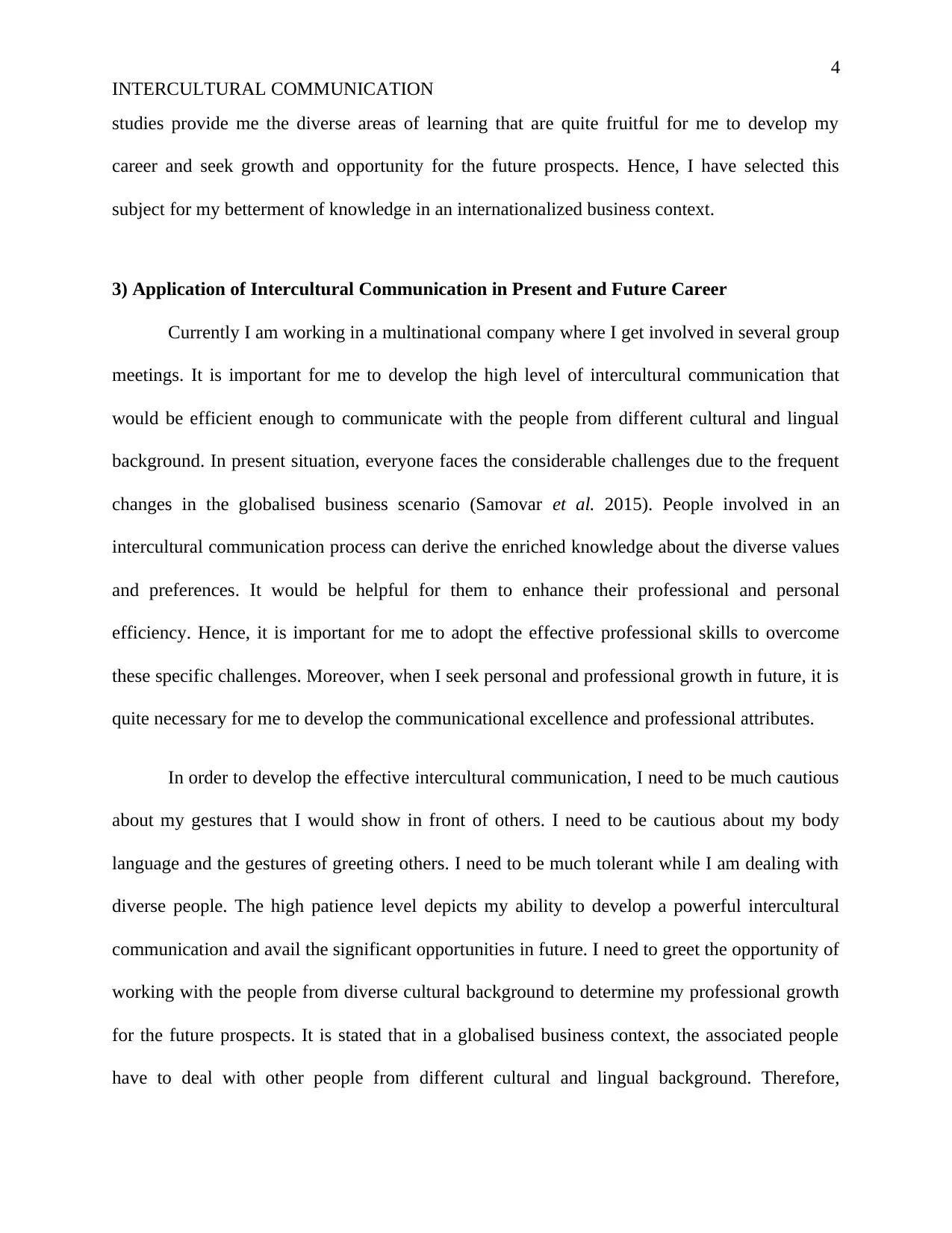
4
INTERCULTURAL COMMUNICATION
studies provide me the diverse areas of learning that are quite fruitful for me to develop my
career and seek growth and opportunity for the future prospects. Hence, I have selected this
subject for my betterment of knowledge in an internationalized business context.
3) Application of Intercultural Communication in Present and Future Career
Currently I am working in a multinational company where I get involved in several group
meetings. It is important for me to develop the high level of intercultural communication that
would be efficient enough to communicate with the people from different cultural and lingual
background. In present situation, everyone faces the considerable challenges due to the frequent
changes in the globalised business scenario (Samovar et al. 2015). People involved in an
intercultural communication process can derive the enriched knowledge about the diverse values
and preferences. It would be helpful for them to enhance their professional and personal
efficiency. Hence, it is important for me to adopt the effective professional skills to overcome
these specific challenges. Moreover, when I seek personal and professional growth in future, it is
quite necessary for me to develop the communicational excellence and professional attributes.
In order to develop the effective intercultural communication, I need to be much cautious
about my gestures that I would show in front of others. I need to be cautious about my body
language and the gestures of greeting others. I need to be much tolerant while I am dealing with
diverse people. The high patience level depicts my ability to develop a powerful intercultural
communication and avail the significant opportunities in future. I need to greet the opportunity of
working with the people from diverse cultural background to determine my professional growth
for the future prospects. It is stated that in a globalised business context, the associated people
have to deal with other people from different cultural and lingual background. Therefore,
INTERCULTURAL COMMUNICATION
studies provide me the diverse areas of learning that are quite fruitful for me to develop my
career and seek growth and opportunity for the future prospects. Hence, I have selected this
subject for my betterment of knowledge in an internationalized business context.
3) Application of Intercultural Communication in Present and Future Career
Currently I am working in a multinational company where I get involved in several group
meetings. It is important for me to develop the high level of intercultural communication that
would be efficient enough to communicate with the people from different cultural and lingual
background. In present situation, everyone faces the considerable challenges due to the frequent
changes in the globalised business scenario (Samovar et al. 2015). People involved in an
intercultural communication process can derive the enriched knowledge about the diverse values
and preferences. It would be helpful for them to enhance their professional and personal
efficiency. Hence, it is important for me to adopt the effective professional skills to overcome
these specific challenges. Moreover, when I seek personal and professional growth in future, it is
quite necessary for me to develop the communicational excellence and professional attributes.
In order to develop the effective intercultural communication, I need to be much cautious
about my gestures that I would show in front of others. I need to be cautious about my body
language and the gestures of greeting others. I need to be much tolerant while I am dealing with
diverse people. The high patience level depicts my ability to develop a powerful intercultural
communication and avail the significant opportunities in future. I need to greet the opportunity of
working with the people from diverse cultural background to determine my professional growth
for the future prospects. It is stated that in a globalised business context, the associated people
have to deal with other people from different cultural and lingual background. Therefore,
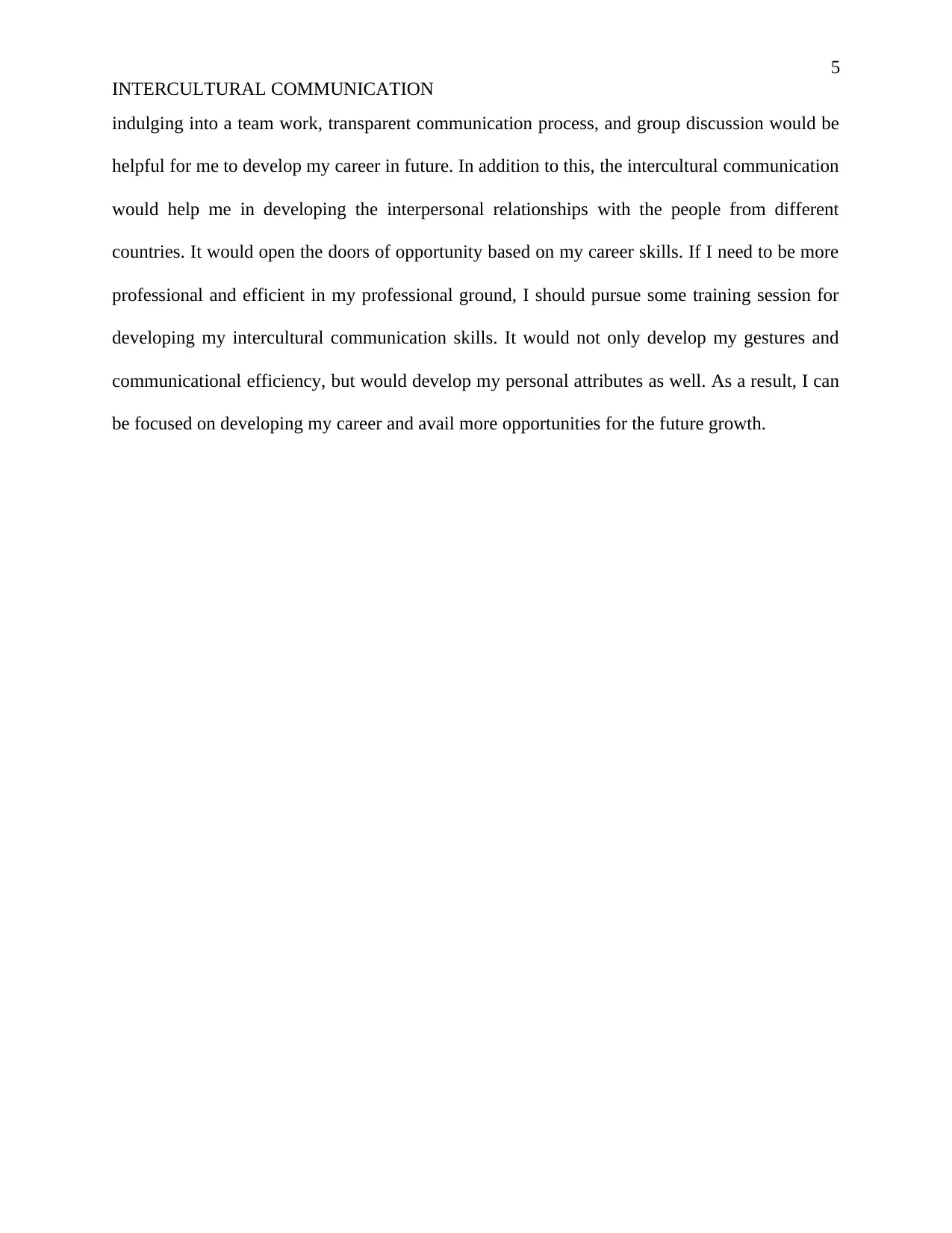
5
INTERCULTURAL COMMUNICATION
indulging into a team work, transparent communication process, and group discussion would be
helpful for me to develop my career in future. In addition to this, the intercultural communication
would help me in developing the interpersonal relationships with the people from different
countries. It would open the doors of opportunity based on my career skills. If I need to be more
professional and efficient in my professional ground, I should pursue some training session for
developing my intercultural communication skills. It would not only develop my gestures and
communicational efficiency, but would develop my personal attributes as well. As a result, I can
be focused on developing my career and avail more opportunities for the future growth.
INTERCULTURAL COMMUNICATION
indulging into a team work, transparent communication process, and group discussion would be
helpful for me to develop my career in future. In addition to this, the intercultural communication
would help me in developing the interpersonal relationships with the people from different
countries. It would open the doors of opportunity based on my career skills. If I need to be more
professional and efficient in my professional ground, I should pursue some training session for
developing my intercultural communication skills. It would not only develop my gestures and
communicational efficiency, but would develop my personal attributes as well. As a result, I can
be focused on developing my career and avail more opportunities for the future growth.
⊘ This is a preview!⊘
Do you want full access?
Subscribe today to unlock all pages.

Trusted by 1+ million students worldwide
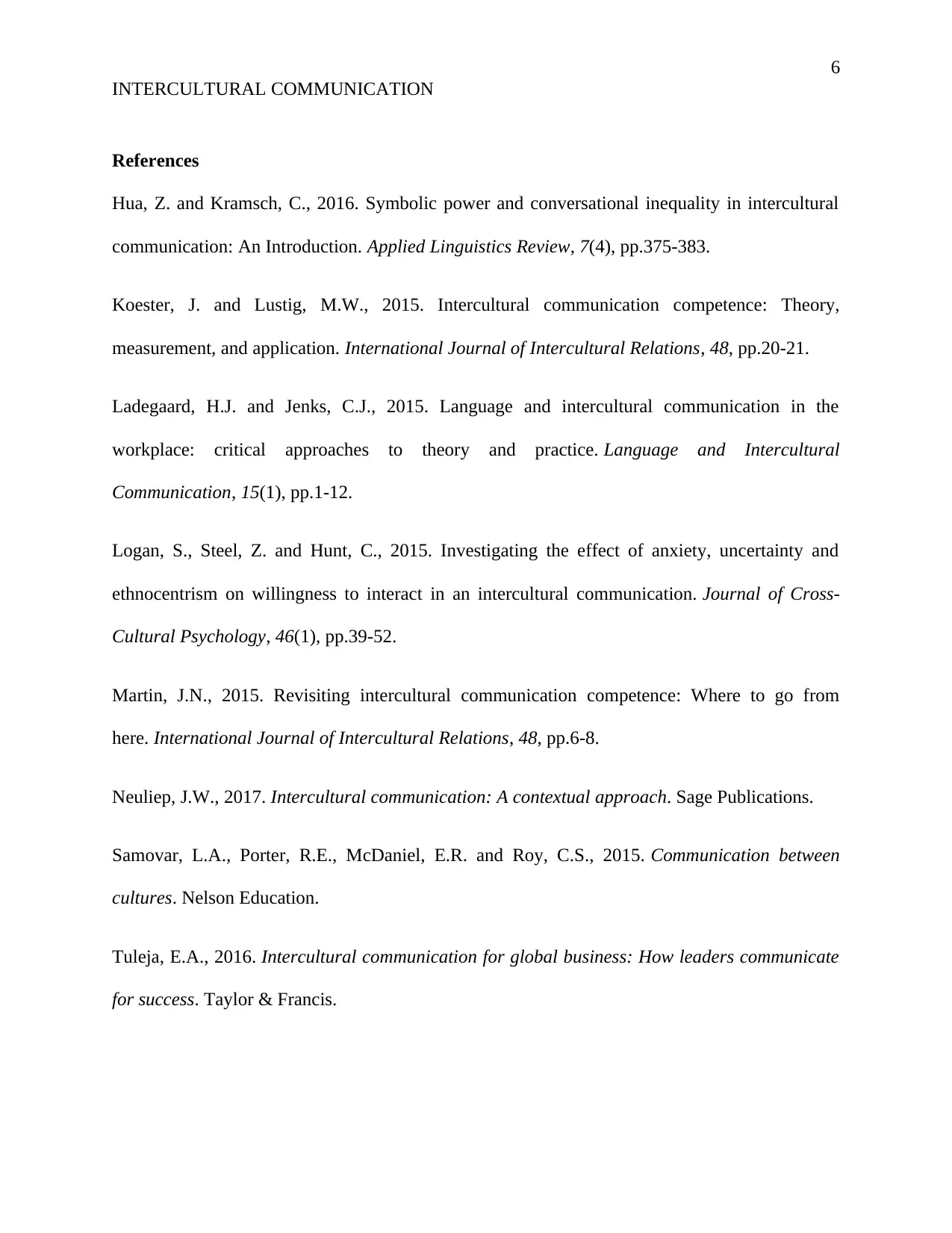
6
INTERCULTURAL COMMUNICATION
References
Hua, Z. and Kramsch, C., 2016. Symbolic power and conversational inequality in intercultural
communication: An Introduction. Applied Linguistics Review, 7(4), pp.375-383.
Koester, J. and Lustig, M.W., 2015. Intercultural communication competence: Theory,
measurement, and application. International Journal of Intercultural Relations, 48, pp.20-21.
Ladegaard, H.J. and Jenks, C.J., 2015. Language and intercultural communication in the
workplace: critical approaches to theory and practice. Language and Intercultural
Communication, 15(1), pp.1-12.
Logan, S., Steel, Z. and Hunt, C., 2015. Investigating the effect of anxiety, uncertainty and
ethnocentrism on willingness to interact in an intercultural communication. Journal of Cross-
Cultural Psychology, 46(1), pp.39-52.
Martin, J.N., 2015. Revisiting intercultural communication competence: Where to go from
here. International Journal of Intercultural Relations, 48, pp.6-8.
Neuliep, J.W., 2017. Intercultural communication: A contextual approach. Sage Publications.
Samovar, L.A., Porter, R.E., McDaniel, E.R. and Roy, C.S., 2015. Communication between
cultures. Nelson Education.
Tuleja, E.A., 2016. Intercultural communication for global business: How leaders communicate
for success. Taylor & Francis.
INTERCULTURAL COMMUNICATION
References
Hua, Z. and Kramsch, C., 2016. Symbolic power and conversational inequality in intercultural
communication: An Introduction. Applied Linguistics Review, 7(4), pp.375-383.
Koester, J. and Lustig, M.W., 2015. Intercultural communication competence: Theory,
measurement, and application. International Journal of Intercultural Relations, 48, pp.20-21.
Ladegaard, H.J. and Jenks, C.J., 2015. Language and intercultural communication in the
workplace: critical approaches to theory and practice. Language and Intercultural
Communication, 15(1), pp.1-12.
Logan, S., Steel, Z. and Hunt, C., 2015. Investigating the effect of anxiety, uncertainty and
ethnocentrism on willingness to interact in an intercultural communication. Journal of Cross-
Cultural Psychology, 46(1), pp.39-52.
Martin, J.N., 2015. Revisiting intercultural communication competence: Where to go from
here. International Journal of Intercultural Relations, 48, pp.6-8.
Neuliep, J.W., 2017. Intercultural communication: A contextual approach. Sage Publications.
Samovar, L.A., Porter, R.E., McDaniel, E.R. and Roy, C.S., 2015. Communication between
cultures. Nelson Education.
Tuleja, E.A., 2016. Intercultural communication for global business: How leaders communicate
for success. Taylor & Francis.
1 out of 7
Related Documents
Your All-in-One AI-Powered Toolkit for Academic Success.
+13062052269
info@desklib.com
Available 24*7 on WhatsApp / Email
![[object Object]](/_next/static/media/star-bottom.7253800d.svg)
Unlock your academic potential
Copyright © 2020–2026 A2Z Services. All Rights Reserved. Developed and managed by ZUCOL.





